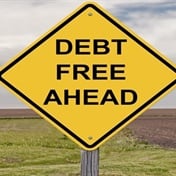
Cape Town - How much debt is too much?
While there is no definite measure, there are ways to determine if you've taken on more than you can handle.
If you cannot pay all your household expenses, including your debt repayments, you have a problem. It may be that you have too much debt, but it may also be that you are not spending your available income correctly, explains debt counsellor Renee Marais.
The most important way to determine whether you have too much debt is by calculating your debt-to-income ratio.
What do you earn and what do you have to pay? Here is a look at the different aspects of your income and expenses.
Gross income: The amount that you actually earn before any deductions.
The first payments one makes are statutory and there is no getting away from that. These payments include tax to the SA Revenue Service (SARS) and to the Unemployment Insurance Fund (UIF).
"We are all responsible for contributing to the financial purse of the country," says Marais.
Net income: After the gross income, you are left with a net income. This is used for other important deductions such as pension, provident fund, medical aid, and more.
These deductions are usually part of your employment contract as fixed deductions and are usually categorised as employer's deduction.
Disposable income: After all your necessary deductions, you are left with your disposable income.
This is the amount reflecting at the end of the month on your bank statement and what is paid over to you to use. How this is used is your responsibility.
Discretionary income: The amount left over after everything that is necessary is paid is called your discretionary income.
This is what is used to pay off debt, for an example. If your discretionary income is less than the monthly instalments needed for your monthly debt repayments, ie, if you can only pay some of your creditors and not others, you are in big trouble, says Marais.
If you find yourself unable to afford your debt, the first thing you must think about it is how you spend your living expenses and where you can cut down.
Marais suggests ways to cut down on unnecessary spending:
1. Buy what you need, not what you want.
2. Get a timer for your geyser. They are well insulated, and one can easily make a blanket with 3 layers of newspaper and tinfoil also if you wish.
3. Don’t buy expensive coffee and other beverages. Take a flask for on-the-go coffee or tea from home.
4. Don’t buy plastic bags from the supermarket, take a cloth bag that can fold up and be reused and washed.
5. Brainstorm on ideas as to how to save on living expenses.
The National Credit Act and Consumer Protection Act were written to assist consumers in various ways. It makes provision for essential living expenses.
These are payments you must make every month in order for you to live such as housing, food, utilities, transport, school fees, insurance, family responsibilities and bank charges.
If you have cut down your spending to the bone and you still don’t have enough funds to pay all your debt obligations under every credit agreement on time, you have to do something. You can, of course, negotiate with your credit provider to make new arrangements.
However, Marais advises that if a credit provider gives you a new loan to assist in paying off an older one, that is not assistance and will be new credit with new costs involved and will not assist you over the longer term.
She further explains that the credit provider could give you a "payment holiday" for 3 months but this will result in additional interest charged when the debt is refinanced and the instalment after 3 months might be higher.
Also, some credit providers will allow for a reduction of the instalment for a period of 6 months. Thereafter there will be a refinancing with again a higher instalment and additional interest. Speak to the credit provider and get the amendment in writing.
Don’t accept any concessions over the phone, warns Marais.
The National Credit Act makes provision for this, but it can only be done in special circumstances with prescribed provisions.
Savings an essential expense
It is important to note that savings is also an essential living expense. If you do not save you have no reserves for emergencies.
Have, for example, a 30- or 60-day savings account - which incidentally has tax benefits and a little more interest than an ordinary savings account. The down side is that you must give the bank notice before you can access the funds.
If you put a bit aside before paying anything else, after 12 months you have something in reserve to pay for emergencies or go on holiday with.
Credit is expensive
Credit is useful in emergencies or for purchasing a car or house. It is not useful for buying food or luxury items.
Rather save in your emergency savings account and then buy the item you need or want and negotiate a discount on cash payments, Marais concludes.
- Renee Marais NCRDC1780 is an Independent Debt Counsellor.
* Sign up to Fin24's top news in your inbox: SUBSCRIBE TO FIN24 NEWSLETTER




 Publications
Publications
 Partners
Partners











